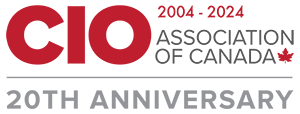CIO Executive Leadership Program and CIO.D™:
Additional Details, CPE, & Code of Conduct
‘CIO.D’ is a trademark of the CIO Association of Canada. Details subject to change.
The CIO Association of Canada is COMMITTED TO LIFELONG LEARNING
The first step in obtaining your CIO.D is registering and completing the Rotman – CIOCAN Executive Leadership Program. Click here to register.
Maintaining the CIO designation is a commitment you make for the rest of your career. The goal in requiring continuing professional education (CPE) is to maintain and improve professional standards. Through continued learning, we want CIO designates to stay relevant and build depth of knowledge in the ever-evolving Information Technology Sector.
CIOCAN Chief Information Officer Designation (CIO.D) Exam details
- 150 multiple choice questions, based on the 10 topics covered throughout the Rotman – CIOCAN CIO Executive Leadership Program.
- Proctored through the on-line Rotman Executive Learning portal.
- Results will be pass or fail, no grade will be assigned.
- A practice exam will be offered ~1 week prior to the actual exam to help prepare each student.
- Exam fee: $250.
How to Maintain Your Chief Information Officer Designation (CIO.D)
By receiving the Chief Information Officer Designation certification, each designate undertakes and agrees:
To comply with:
- The Code of Ethics and Professional Standards of CIO.D and all other professional codes for bodies and associations to which he/she belongs.
- To conduct him/herself in a manner that supports the purpose, vision, mission and goals of the CIO Association of Canada.
- To maintain membership in good standing in the CIO Community of The CIO Association of Canada by paying your annual membership fees.
- To commit each year to ongoing professional development and learning, and to complete the required hours of approved Continuing Professional Education (CPE).
CIO.D Continuing Professional Education Credits
The CIO Designation is valid for three years, after which it must be renewed to maintain the designation. Renewal applications will be reviewed by the CIOCAN board which includes the validation of required CPE credits. A CIO or Senior IT Leader must keep himself or herself up to date according to the changing dynamics of the world. To do this, CIO professionals must continue their professional education.
CIO Association of Canada requires a minimum of 90 CPE credits in a 3-year period to maintain the CIO.D certification.
How to Earn CPE Credits
There are several ways to earn CPEs for renewing your CIO.D.
CPE credits include:
- Publishing a book, whitepaper, or article on IT Leadership or CIO Content.
- Attending conferences, relevant educational courses, seminars, or presentations focused on CIO or Senior IT Leadership Topics i.e. CIOCAN events.
- Taking a higher academic course related to CIO content.
1 CPE Credit is obtained for every hour of one of these activities. In total this equated to 90 hours of this activity for your 3-year period.
After earning CIO.D CPE credits, you must submit them under your profile on the CIO.D CPE PORTAL A CIOCAN Administrator will review submitted CPE credits, to confirm they are aligned with the CPE requirements of CIO.D. Once all 90 credits have been submitted and approved, you will be able to renew your CIO.D certification at the end of the three-year period.
CIOCAN Membership Fee
While you are completing CIO.D CPE credits to renew your CIO.D certification, you must be paying the annual CIO Association of Canada membership fee as well.
CIO.D Code of Conduct
As a member of the CIO Community and the CIO Association of Canada, I recognize the importance of upholding the highest standards of integrity, professionalism, and ethical behavior in all aspects of my role. This Code of Conduct serves as a guide for my behavior and that of my team, ensuring that we conduct ourselves in a manner consistent with the values and objectives of the organization.
Ethical Behavior
- Integrity: I will act honestly and ethically in all my dealings, avoiding conflicts of interest and ensuring that decisions are made in the best interests of the organization.
- Confidentiality: I will respect the confidentiality of information entrusted to me, ensuring that sensitive information is protected from unauthorized access or disclosure.
- Compliance: I will comply with all relevant laws, regulations, and organizational policies, including those related to data protection and privacy.
- Professionalism: I will conduct myself in a professional manner, treating colleagues, stakeholders, and third parties with respect and courtesy.
Responsibilities
- Strategic Leadership: I will provide strategic direction for the organization’s information technology initiatives, aligning them with the overall business objectives.
- Risk Management: I will identify and manage risks related to information technology, ensuring that appropriate controls are in place to mitigate these risks.
- Governance: I will establish and maintain effective governance structures for information technology, ensuring that decisions are transparent and accountable.
- Stakeholder Engagement: I will engage with stakeholders, including senior management, employees, and external partners, to ensure that their needs are understood and addressed.
- Continuous Improvement: I will promote a culture of continuous improvement within the information technology function, seeking opportunities to enhance efficiency and effectiveness.
Compliance and Enforcement
- Compliance: I understand that compliance with this Code of Conduct is a condition of my employment as CIO of [Company Name].
- Enforcement: Violations of this Code of Conduct may result in disciplinary action, up to and including termination of employment.
